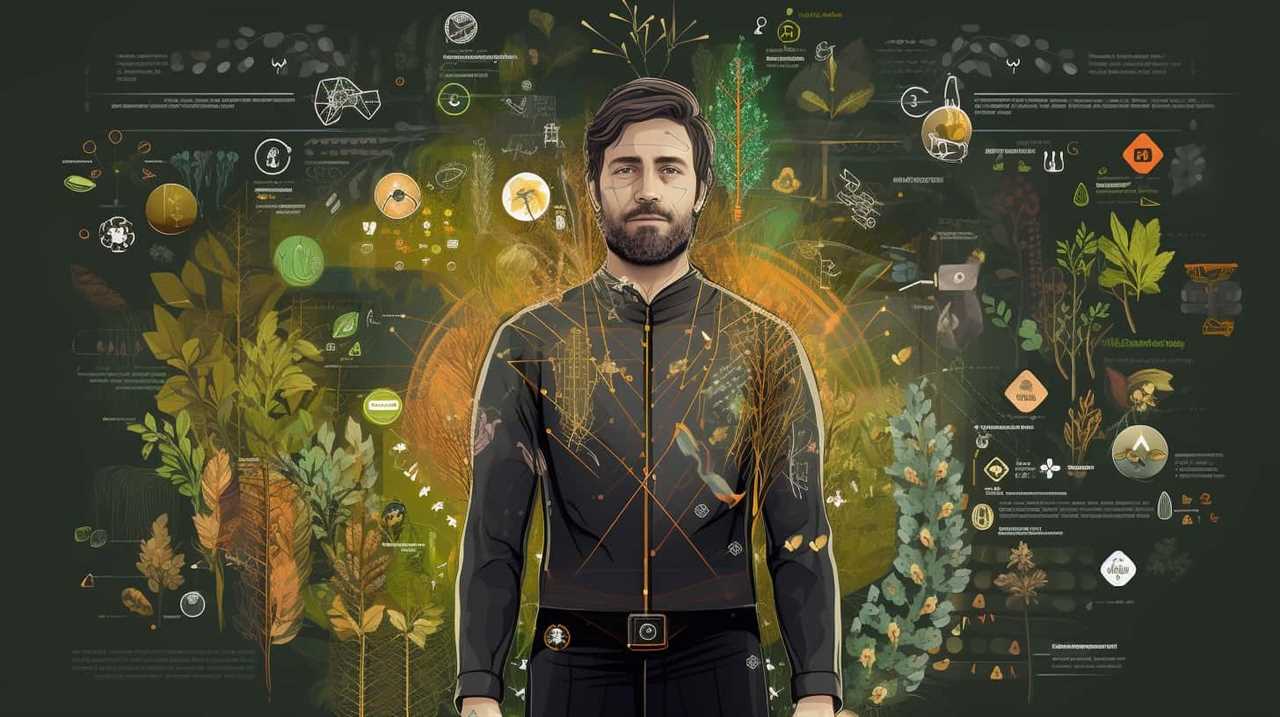We embark on a thrilling journey, exploring the clash between AI and drug discovery. This quest is filled with challenges such as locating and verifying data quality, understanding the complexities of biological systems, interpreting results, dealing with high costs and lengthy timelines for innovation, as well as facing ethical and regulatory dilemmas.
However, we are determined to tackle these hurdles head-on, utilizing the power of AI to revolutionize the field of drug discovery. Join us as we navigate this thrilling ride towards groundbreaking advancements in medicine.
Key Takeaways
- Data availability and quality are crucial for AI-driven drug discovery, emphasizing the importance of diverse and comprehensive datasets, data validation, and cleaning.
- The complexity of biological systems, including interconnected components and genetic variability, poses challenges in predicting drug response and requires a deep understanding of intricacies.
- Interpretability and explainability are significant challenges in AI-driven drug discovery, highlighting the need for transparent and interpretable models to gain trust and acceptance from stakeholders.
- The high cost and long development timelines in drug discovery can be addressed through AI, which offers opportunities for cost-effective solutions and accelerated drug development processes.

Data Availability and Quality
In our journey through Ai’s battle with drug discovery, we find ourselves faced with the crucial issue of data availability and quality.
The success of any AI-driven drug discovery process heavily relies on the accessibility and validation of the data used. Data accessibility refers to the ease with which researchers can obtain relevant data for their analysis. This includes access to diverse and comprehensive datasets that cover a wide range of molecular information.
On the other hand, data validation ensures that the collected data is accurate, reliable, and free from any biases or errors. It involves rigorous quality control measures, such as data cleaning, normalization, and verification.
Without proper data accessibility and validation, the effectiveness of AI algorithms in drug discovery can be compromised, leading to inaccurate predictions and flawed outcomes. Therefore, it’s imperative to prioritize data availability and quality to enable robust and reliable AI-driven drug discovery processes.

Complexity of Biological Systems
Understanding the intricacies of biological systems is essential for navigating Ai’s battle with drug discovery. Biological systems are incredibly complex, with a multitude of interconnected components and variables. Genetic variability, for instance, plays a significant role in how drugs interact with individuals. The genetic makeup of each person can vary, leading to different responses to medications. This variability can make it challenging to predict how a drug will work in different patients, as drug resistance can develop due to genetic differences.
Additionally, biological systems are dynamic and constantly changing, making it difficult to develop drugs that can effectively target specific diseases. These complexities highlight the need for Ai to have a deep understanding of the intricacies of biological systems in order to overcome challenges such as genetic variability and drug resistance.
Transitioning to the next section, these complexities also contribute to the lack of interpretability and explainability in Ai’s battle with drug discovery.

Lack of Interpretability and Explainability
Navigating the complexities of biological systems, we encounter the challenge of the lack of interpretability and explainability in Ai’s battle with drug discovery. While artificial intelligence (Ai) has shown promise in accelerating the drug discovery process, its black-box nature poses significant interpretability challenges and explainability issues. The inability to understand and explain the reasoning behind Ai’s predictions and decisions creates a barrier to trust and acceptance in the pharmaceutical industry. Stakeholders, including regulatory bodies and healthcare professionals, require transparent and interpretable models to ensure safety, efficacy, and ethical considerations. Table 1 highlights some key challenges in achieving interpretability and explainability in Ai-driven drug discovery:
| Challenges | Impact |
|---|---|
| Lack of transparency in deep learning models | Difficult to understand how predictions are made |
| Complexity of biological systems | Difficulty in capturing all relevant variables and interactions |
| Limited interpretability of complex algorithms | Inability to provide meaningful explanations for predictions |
| Legal and ethical implications | Concerns regarding accountability and bias |
Addressing these challenges is crucial for Ai to gain wider acceptance and become a valuable tool in drug discovery. Efforts are underway to develop interpretable and explainable Ai models, such as transparent machine learning techniques and rule-based systems. By enhancing interpretability and explainability, Ai can unlock its full potential in revolutionizing the drug discovery process.

High Cost and Long Development Timelines
As we delve deeper into the challenges of Ai’s battle with drug discovery, one significant hurdle that arises is the high cost and long development timelines.
Developing new drugs is a complex and resource-intensive process that requires substantial financial investment and extensive time commitment. The cost of research and development (R&D) for pharmaceuticals has been steadily increasing over the years, making it difficult for smaller companies or academic institutions to participate in drug discovery efforts. Additionally, the lengthy development timelines further exacerbate the financial burden, as it takes an average of 10 to 15 years to bring a new drug to market.
However, recent technological advancements in artificial intelligence (AI) offer promising opportunities for cost effective solutions. By leveraging AI algorithms and machine learning techniques, researchers can accelerate the drug discovery process, reduce costs, and improve overall efficiency. These advancements enable the identification of potential drug candidates, prediction of their efficacy, and optimization of their properties, thereby streamlining the development timelines.
While there are still challenges to overcome, such as data quality and regulatory considerations, the integration of AI in drug discovery holds great potential for creating more affordable and efficient solutions.

Ethical and Regulatory Challenges
Moving forward from the previous subtopic, we encounter ethical and regulatory challenges in our battle with drug discovery.
In the realm of AI-driven drug discovery, privacy concerns arise due to the vast amount of patient data required for analysis. As AI algorithms rely on large datasets to generate accurate predictions, the potential for misuse or unauthorized access to sensitive patient information becomes a pressing issue. Striking a balance between leveraging patient data for innovation and protecting individual privacy is crucial.
Furthermore, patient advocacy plays a vital role in the ethical considerations of AI in drug discovery. Ensuring that patients have a voice in the development and application of AI technologies can help address concerns relating to transparency, informed consent, and fair access to healthcare advancements.
To navigate these ethical and regulatory challenges, collaboration between stakeholders, including researchers, AI developers, healthcare providers, and regulatory bodies, is imperative.

Frequently Asked Questions
How Can the Lack of Data Availability and Quality Hinder the Progress of Drug Discovery Using Ai?
Data scarcity and poor quality impede progress in AI-driven drug discovery. Without sufficient data, algorithms struggle to make accurate predictions and identify potential drug candidates. This hinders the development of effective treatments and slows down the discovery process.
What Are the MAIn Challenges Posed by the Complexity of Biological Systems When It Comes to Implementing AI in Drug Discovery?
Challenges arise when implementing AI in drug discovery due to the complexity of biological systems. The intricate interactions and diverse variables make it difficult to accurately model and predict outcomes, hindering progress in this field.
Why Is the Lack of Interpretability and ExplAInability in AI Models a Concern in the Field of Drug Discovery?
The lack of interpretability and explainability in AI models is a concern in drug discovery. It’s like navigating in the dark without a map, making it difficult to understand how and why the models make certain predictions or recommendations.
How Does the High Cost and Long Development Timelines Associated With AI in Drug Discovery Impact the Overall Efficiency of the Process?
The high cost and long development timelines associated with AI in drug discovery impact the overall efficiency of the process. We can address this by implementing cost-effective strategies and leveraging technological advancements to streamline and accelerate drug discovery.
What Are the Major Ethical and Regulatory Challenges Faced When Integrating AI Into the Drug Discovery Process, and How Are They Being Addressed?
What ethical and regulatory challenges arise when integrating AI into drug discovery? How are they addressed? We explore the complexities of ethical considerations and regulatory compliance in this evolving field.

Conclusion
In the thrilling rollercoaster ride of drug discovery, AI has proven to be both a promising ally and a formidable adversary. With data availability and quality, complexity of biological systems, lack of interpretability and explainability, high costs, long development timelines, and ethical and regulatory challenges, AI faces a multitude of obstacles.
However, with perseverance and innovation, AI has the potential to revolutionize the field of drug discovery and lead us to new heights of medical breakthroughs.
So buckle up, because this ride is just getting started.









